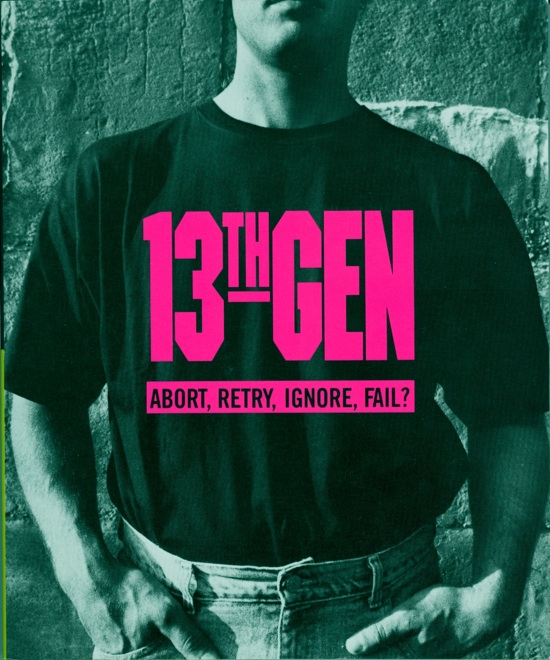Jacko and Farrah
By:
July 2, 2009
Earlier this week, Boston Globe columnist Alex Beam gave my generational periodization scheme a shout-out. Beam writes:
Glenn has devoted considerable time — too much time, frankly — to slicing up the post World War II generations not as the Census Bureau does but into narrower, more meaningful tranches. For instance, he eschews the media-generated labels of “Gen X” and “Gen Y.” substituting instead “The
PCReconstructionist Generation” (born 1964-73) and “TheNetRevivalist Generation,” (born 1974-83). Amusingly, he calls my generation (born 1954-63) “The Original GenXers”: “The Original Generation X is cynical, ironic, skeptical — which is not the same as directionless, nihilistic, or depressed!” he insists…. Glenn finds it unsurprising that my generation has embraced either conservatism, or the “soft ideologies” of ecologism and antiracism, instead of, say, social justice.
One mainstream journalist converted! But this is no time to rest on our laurels. A couple of days before that, The New York Times published a (widely published) AP cultural trend-piece, by Ted Anthony, which used the deaths of Farrah and Jacko as an excuse to — once again — trot out the broken-down shibboleth called “Generation X.”

“When [Michael Jackson and Farrah Fawcett-Majors] departed Thursday, just a few hours and a few miles apart,” writes Anthony, “they left an entire generation — a very strange generation indeed — without two of its defining figures.” Let’s see, Farrah was born in ’47, making her a Boomer by anyone’s reckoning; and MJ was born in ’58, which makes him a late or post-Boomer, according to generally accepted periodizations (not mine, of course). So what generation is Anthony talking about? That’s right. Whenever journalists make wildly nonsensical claims about a generation, you can bet they’re talking about the nonexistent Generation X.
“Cynical, disaffected, rife with ADD, lost between Boomers and millennials and sandwiched between Vietnam and the war on terror,” writes Anthony, “Gen X has always been an oddity.” Worse, this so-called generation “struggled to find its place” and now “must wonder if it is as passé as the paper and vinyl that its icons’ most memorable moments were etched upon.” Middlebrow alert! These descriptions reflect journalists’ barely suppressed awareness that there is no such thing as Generation X.
If journalists must continually trot out weasely descriptors like “strange,” “odd,” and “lost” to describe a generation, this is evidence that they’ve been misled. When others do so, it’s evidence that they’re trying to mislead. This is why Richard Thau, founder of the suspect “Gen X” political action committee/think tank Third Millennium said: “The soul of Gen X is amorphous, intangible, elusive.” It’s why an influential 1990 Time Magazine story on “twentysomethings” claimed that the post-Boomer generation (not yet named X) “possess only a hazy sense of their own identity.” And it’s why Neil Howe and William Strauss wrote: “Compared to any other generation born in this century, [Generation X] is less cohesive, its experiences wider and its culture more splintery.”
Note to Mr. Anthony: It’s middlebrow journalists who struggle to make their fictional generation seem meaningful; it’s middlebrow journalists who must wonder if their own ill-made construct is passé. This is a truth they cannot admit to themselves, much less to readers. Why? Because Generation X is too convenient a fiction. We’ll return to this point; first, let’s revisit my claim that there is no Gen X.
If there is any such thing as a generation, then surely each one should be as easily discernible as the (early) Boomers or the (late) Greatests. The so-called Generation X, a construct invented by pop sociologists, middlebrow journalists, and marketing consultants, is actually composed of members of two distinct, easily discernible generations — younger OGXers and older Reconstructionists, to use my own periodization. Neither of these generations is strange, odd, lost, struggling to find a place for itself, or worried that it is passé; none of those concepts can be applied to an actually existing generation. That this is the case seems glaringly obvious, to me. So why do we continue to hear about Gen X?
To put it in HiLobrow.com’s terms: Why does Middlebrow want us all to believe in a “Generation X”?

Here’s why. It’s because younger OGXers and older Reconstructionists did share one trait in common, around the time when “Generation X” was invented. They (we) rejected the brave new world of the Eighties (1984-93), when society split into two warring camps — defined not by nominal religion, ethnicity, social class, or political affiliation, but by ideological world views. As James Davison Hunter noted in Culture Wars: The Struggle to Define America, in the Eighties there were suddenly only two positions that one could take on hot-button issues like abortion, gun politics, separation of church and state, privacy, homosexuality, and censorship: “conservative” or “liberal.” Which no longer meant, as they formerly had, Lowbrow or Highbrow. During the Eighties, they both meant: Middlebrow.
At a time when everyone was struggling with the question of “choice,” choice had been reduced to voting for one or another stripe of Middlebrow. The so-called Generation X didn’t stand for anything; its members — actually OGXers and Reconstructionists — were united only in their antipathy to Middlebrow cultural politics. Middlebrow journalists, sociologists, marketers, and other defenders of the status quo found it convenient, during the early Nineties (1994-2003) to lump these dissenters together, label them with a pejorative moniker, and describe them as losers.
Apparently, they still do!
